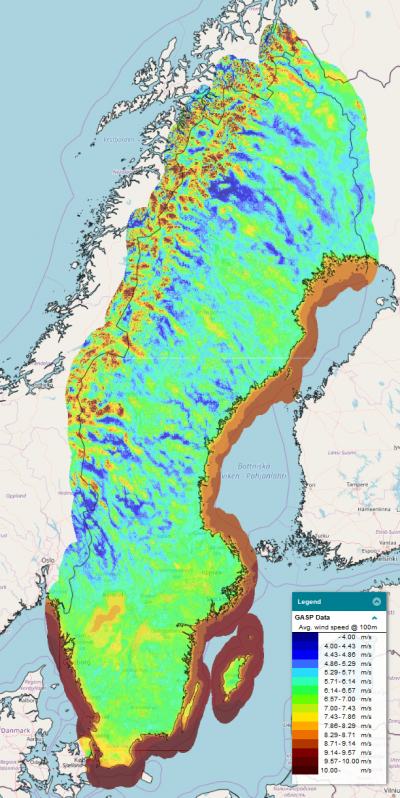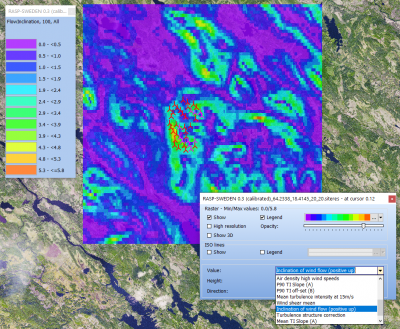RASP Sweden


Introduction
'RASP-Sweden 0.3 (calibrated)' is a calibrated Regional Atlas of Siting Parameters (RASP) for Sweden for wind turbine resource evaluation and siting. A geospatial calibration procedure has been used to remove bias and reduce errors in the 'raw' GASP parameters. The dataset is released in windPRO 3.5+ and holds the following key features:
- Regional Coverage: Sweden
- Geospatially calibrated parmeters, 250m grid resolution
- Parameters available: wind resource, siting parameters & turbine design classification
- Builds on DTU GWA (Global Wind Atlas) datasets and EMD's Load Response technology
- Is developed in the GASP project - a joint R&D project by EMD and DTU
Dataset Overview
- Spatial coverage:
- Onshore: Swedish National Coverage - and up to 50km from Swedish borders
- Offshore: Areas are covered up to approximately 50 km from the coastline
- Resolution:
- Horizontal: 250m in grid resolution
- Vertical: 100m and 150m hub height
- Data-type: Atlas
- Coordinate system: Geographical coordinates (EPSG: 4326) in original data
- Version: 0.3 (this dataset is a demonstration dataset, and it is currently in beta release)
Validation and Usage Notes
- How accurate is your resource and load-analysis based on GASP and RASP data - wihtin windPRO or windPROSPECTING?
We have prepared a small validation note - based on data from 50+ high quality meteorological towers in Sweden - that gives you a first hint on bias and uncertainty - read more - here.
If you are interested in the global GASP-validation (based on 241 masts), that is availble from the wiki-page for GASP or HERE.
Availability from within EMD software
- windPRO: In 'Data' menu click 'Siting parameters (GASP etc)' to access the download tool. Data is loaded into a result layer with a .siteres file acting as the data-container.
- The .siteres file can be used in PARK, Site Compliance, Load Response and Optimization calculations.
- windPROSPECTING: GASP data is available through the data-tab named 'Site-prospecting'. Free access to windPROSPECTING - here.
- windprospecting offers spatial view of omnidirectinal parameters and detailed point-data with directional results and statistics.
- EMD-API: Read more at the dedicated wiki-page for our Global Atlas Data Services - here. If you are accessing the GASP data from within the EMD-API, you will use the parameter group-names in order to request specific data-packages [resource-omni, resource-sector, siting-extremes, siting-fatigue-omni, siting-fatigue-sector, turbine-fatigue, turbine-fatigue-recommend, turbine-extreme, turbine-extreme-recommend].
Parameters and Dimensions
For the list of parameters available - please see the GASP-Global dataset.
The RASP-Sweden set of parameters are similar to the GASP-Global, however the vertical dimension is currently limited to 100m and 150m a.g.l. (as opposed to the GASP-Global with 3 heights of 50m, 100m and 150m).
Attribution
If data from this dataset is used within any private or public disseminations, then EMD and its data providers must be acknowledged.
Source: RASP-Sweden version 0.3 is a regional atlas of site parameters accessible via windprospecting.com, windPRO and EMD-API. This dataset builds and extends upon the GASP 1.0 dataset - developed by EMD and DTU.
Acknowledgement
- RASP Sweden was made as a part of the GASP-Project. GASP is the result of a BIG collective effort by many people at: EMD International A/S & DTU Wind Energy, with overall project manager Xiaoli Larsén
- Develoment and integration of this dataset into EMD services was done through the GASP project which is co-funded by the EUDP and the Danish Energy Agency
External Links & References
- GASP Project Home-Page at DTU - here
- A peer-reviewed paper is being prepared and will be referenced here as the main reference for the GASP methods and technologies